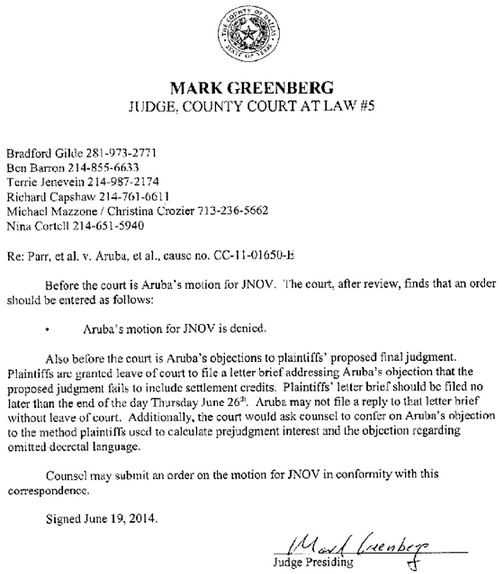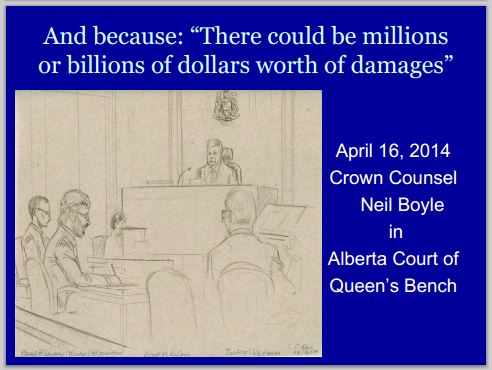Judge Approves Three Million Dollar Verdict in Fracking Lawsuit Mose Buchele, June 20, 2014, State Impact Texas
Aruba asked Dallas County Judge Mark Greenberg to throw out the three million dollar verdict. But late Thursday Greenberg denied that motion.
The case is important because drilling companies often reach out-of-court settlements with plaintiffs. Those can include gag orders. This time there was no settlement, so the details of the Parrs’ sickness, including nosebleeds, rashes and stomach problems were made public.
… Tom McGarity, a law professor at UT Austin calls the judge’s ruling “a bad precedent for the industry.”
“I think there are plaintiffs’ lawyers out there right now that are looking at this case and saying this is a really opportunity here to raise claims by people who have been damaged either in their property values or health,” he says.
In a statement released after the judges ruling, Aruba petroleum said it planned to file additional post-verdict motions. If the company chooses to appeal, the process could continue for years.
Texas Energy Co. Can’t Duck $2.9M Fracking Nuisance Verdict by Sean McLernon, June 20, 2014, Law360, New York
A Texas state judge on Thursday refused to throw out a $2.9 million jury award to a family who blamed health problems on natural gas wells drilled by Aruba Petroleum Inc. on neighboring property, denying the company’s motion for judgment notwithstanding verdict. [JNOV] Dallas County Court Judge Mark Greenberg issued a one-page ruling shooting down arguments from Aruba that the jury didn’t properly apply the law to the facts of the case. [Emphasis added]
Dallas County Court Judge Mark Greenberg: “Aruba’s motion for JNOV is denied”
Judgment Notwithstanding the Verdict: A judgment entered by the court in favor of one party even though the jury returned a verdict for the opposing party
The phrase “judgment notwithstanding the verdict” is abbreviated JNOV, which stands for its Latin equivalent, judgment “non obstante veredicto.”
The remedy of JNOV applies only in cases decided by a jury. Originally this remedy could be entered only in favor of the plaintiff, and the similar remedy of arrest of judgment could be entered only in favor of the defendant. Under modern law a JNOV is generally available to both plaintiffs and defendants, and an arrest of judgment is primarily used with judgments in criminal cases. A JNOV is proper when the court finds that the party bearing the Burden of Proof fails to make out a Prima Facie case (a case that on first appearance will prevail unless contradicted by evidence).
To be granted relief by a JNOV, a party must make a motion seeking that relief. The motion generally must be made in writing and must set forth the specific reasons entitling the party to relief. Many statutes and rules require that the moving party must have previously sought a directed verdict, and that the grounds for the JNOV motion be the same or nearly the same as those for the directed verdict. A directed verdict is a request by a party that the judge enter a verdict in that party’s behalf before the case is submitted to the jury. Although a jury generally must return a verdict before a motion for JNOV can be made, if the jury does not agree on a verdict, as in a jury deadlocked, some courts will hear a motion for JNOV. However, some statutes do not permit a court to hear a motion for JNOV under such circumstances.
In deciding a motion for JNOV, the court is facing questions only of law, not fact. … In entering a JNOV, the court is simply reversing the jury’s verdict; the motion cannot be the basis for increasing or decreasing the verdict. When granting a JNOV, the court needs to independently assess the damages or order a new trial on the issue of damages.
Judge Upholds Jury Verdict for Family in Texas Fracking Case, Judge accepts jury verdict that awarded $2.9 million to family affected by air emissions from gas and oil wells near their Wise County home by David Hasemyer, June 19, 2014, InsideClimate News
The judge presiding over a pivotal case involving toxic emissions from gas and oil drilling has accepted a jury verdict that awarded $2.9 million to a family who said the emissions have made them sick. Judge Mark Greenberg issued a one page ruling late Thursday denying a motion by Aruba Petroleum to reject the jury’s verdict. Among Aruba’s arguments rejected by Greenberg were that Bob and Lisa Parr did not prove the emissions that made them sick came from Aruba wells.
The Parrs filed their lawsuit in March 2011, claiming they were “under constant, perpetual, and inescapable assault of Defendants’ releases, spills, emissions, and discharges of hazardous gases, chemicals, and industrial/hazardous wastes.” Following a two-week trial in April, a Dallas County jury found that Aruba “intentionally created a private nuisance” that affected the family’s health and awarded the Parrs damages. The case is one of the first successful U.S. lawsuits alleging that toxic air emissions from oil and gas production have sickened people living nearby.
Lisa Parr said Greenberg’s ruling further validates the family’s claim of being made sick by emissions generated by Aruba.
“We have had a jury hear the evidence and say that it was Aruba’s fault,” Parr said. “Now we have a judge who heard the evidence say that the jury was right.”
The company had earlier paid $108,000 to settle a court case brought against it by the Texas Attorney General’s Office. In that case, an inspector for the Texas Commission on Environmental Quality was sickened after he began collecting air samples in response to a complaint from the Parrs, according to an agency report. Using an infrared camera, he identified “heavy plumes” of emissions wafting from the Aruba facility and toward the Parr house, 280 feet away.
Greenberg’s ruling sets the stage for a possible appeal by Aruba, a step that could take the case into a system that becomes progressively more political and philosophically in tune with business at its higher levels. Neither a spokesman for Aruba nor the company’s attorneys were available for comment. … “Losing this case was not good for the industry,” said Thomas McGarity, a University of Texas law school professor who specializes in environmental and administrative law, in an interview with InsideClimate News last month.
“My guess is the industry will coalesce around this case. The industry will want to stop the dam from breaking wide open…This is where they will take a stand.”
Robert Percival, director of the University of Maryland’s Environmental Law Program, said the judge’s decision was “another important step toward providing redress to those exposed to the unpleasant side effects of fracking operations.” [Emphasis added]
United States: Tort Risks Related To California Fracking by Todd O. Maiden, Marilyn A. Moberg and Michael Mandell, June 20, 2014, Mondaq
A few months ago, we discussed the Fiorentino case where Pennsylvania plaintiffs alleged an oil and gas company improperly conducted hydraulic fracturing, which allowed the release of toxic chemicals on their land and into their groundwater. At the time, the Fiorentino court was unwilling to dismiss the plaintiffs’ claims until the record was more fully developed. Among those claims was a claim for strict liability whereby the plaintiffs claimed that hydraulic fracturing is an abnormally dangerous activity under Pennsylvania law. Fiorentino v. Cabot Oil & Gas Corp., 750 F. Supp. 2d 506 (M.D. Pa. 2010). Recently, the Fiorentino court rendered a decision declining to “take a step which no court in the United States has chosen to take, and declare hydraulic fracturing to be an ultra-hazardous activity that gives rise to strict tort liability.” Fiorentino, No. 3:09-cv-02284, Doc. 489 at 1.
The court, adopting the magistrate judge’s report and recommendation, went through the six factors set forth in the Restatement (Second) of Torts § 520 to determine whether hydraulic fracturing legally qualifies as an ultra-hazardous activity giving rise to strict liability. Id. at 23. These are the same six factors that California courts use when evaluating whether strict liability should apply to individual cases without precedent. Edwards v. Post Transp. Co., 228 Cal. App. 3d 980, 985 (1991).
In short, Fiorentino found that the plaintiffs failed to meet any of the six factors because they had presented no evidence that a properly constructed and completed gas well would still lead to water contamination or fluid migration. Fiorentino, Doc. 489 at 29. Instead, the plaintiffs’ limited evidence consisted only of an expert report describing the possible negligence of the defendants (i.e., that fluid migration from the wells was “likely” due to a lack of due care relating to “faulty well design and/or construction”). Id. The court was also persuaded by the “surplus of evidence not only attesting to the relative safety of natural gas drilling operations, but also to the fact that such operations are a common, growing, and important part of a modern, highly industrial society . . . .” Id. at 10. Accordingly, the court granted the defendants’ motion for summary judgment on the plaintiffs’ claims for strict liability. Id. at 37.
That said, although strict liability may be an uphill battle for plaintiffs, other causes of action still remain viable. In April, a Texas family was awarded 2.9 million in the first toxic tort jury verdict over fracking. They succeeded on an intentional nuisance claim. Parr v Aruba Petroleum Inc., Tex. County Ct., No. CC-11-01650-E. [Emphasis added]
judgment notwithstanding the verdict (N.O.V.) n. reversal of a jury’s verdict by the trial judge when the judge believes there was no factual basis for the verdict or it was contrary to law. The judge will then enter a different verdict as “a matter of law.”
[Refer also to:
Slide from Ernst presentation in Courtenay, BC on May 24, 2014
An Alberta government lawyer argued in court this week that Jessica Ernst’s lawsuit on hydraulic fracturing and groundwater contamination should be struck down on the grounds that it would open a floodgate of litigation against the province.
‘There could be millions or billions of dollars worth of damages,’ argued Crown counsel Neil Boyle.


